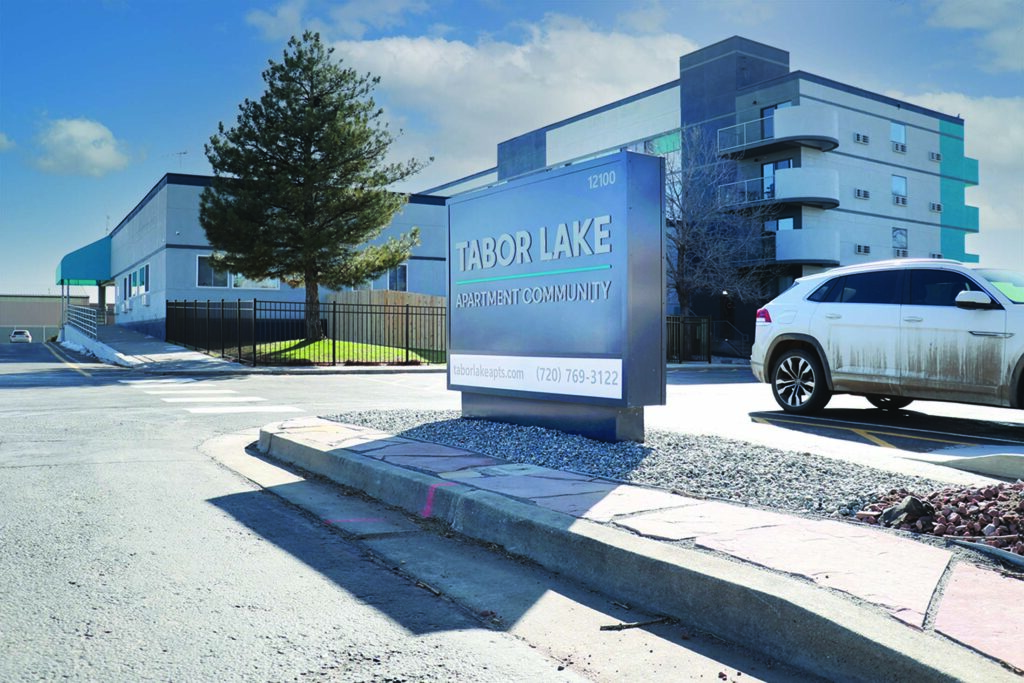Colorado Workforce Housing Solutions, an affordable housing development company based in Colorado Springs, and Aquasan, a water and energy consulting firm In Wheat Ridge, are collectively refuting the $400,000 impact fee being charged by the Valley Water District and Denver Water for construction of the Tabor Lake Apartments on 44th Avenue and Tabor Street.
Impact fees are charged to developers for changes in water use and infrastructure when building new construction or converting a property for new uses, and they must be paid in full before construction can proceed.
But in this case the developers, who paid the charge under protest, are rejecting the viability of the charge on the grounds that water use is expected to decline at the site of the new Tabor Lake Apartments, and infrastructure to service the building will stay the same.
The building used to be the Howard Johnson hotel which included a restaurant and bar and 128 rooms. According to a water assessment conducted by Aquasan, the hotel used an estimate of 4,672,000 gallons of water per year.
The Tabor Lake Apartments will feature 97 units and is projected to use between 3,102,000 and 4,051,000 gallons per year — an estimated reduction of at least 621,000 gallons of water use per year. The water meter infrastructure is the same as the hotel used, and wastewater providers are not indicating that there will be any additional impact on wastewater.
Ultimately, this cost would fall on residents via higher monthly water bills, which is a concern, considering the apartments are earmarked for residents who are between 55% and 80% of the average monthly income, defined as low-income and very low-income, said Kaleb Zanett, principal at Aquasan.
“We recognize that growth pays its own way. We’re not asking for a subsidy, but what we’re asking for is that we’re not being charged for more capacity or resources than what’s required,” Zanett said.
Aquasan and The Valley Water District met to discuss the impact fee on Feb. 13. The District asked “thoughtful questions,” Zanett said, but did not seem to refute the charge that there should not be an impact fee. Denver Water did not attend the meeting, but wrote in prior communications that they were following policy in determining the impact fee.
“What we proposed is that our impacts should be assessed only to defray the impact costs on the system,” Zanett said. “If there are no additional impacts, then we should not have an impact fee. If there are additional fees, those should be classified as something outside of an impact fee.”
The Valley Water District responded with the following statement on Feb. 15:
The Board of Directors of the Valley Water District has determined that the tap fees… were correctly calculated and applied in accordance with the District’s rules and regulations. The District does not charge tap fees based upon estimated water consumption. Tap fees reflect access to infrastructure rather than a means to encourage reduction in consumption. The District’s rules and regulations are applied in a consistent and equitable manner to all customers. It would be unfair to all of the District’s other customers… to subsidize the development of the Tabor Lake Apartments by the District discounting the tap fees.
Aquasan has encountered similar situations in which flat fees or seemingly-outsized impact fees are being charged by water providers despite water use being expected to decline at the new property, Zanett said.
“It has been a problem across the hi Denver Metro area, really the front range, and a number of water providers on those costs carrying over to the end user of the residence,” Zanett added.
Aquasan worries that this will deter developers from building affordable housing and from investing in water-saving features, Zanett said.
“If you’re not going to reward development for trying to be efficient and use less water, what’s the point of them going above and beyond to do LEED certifications or water conservation measures?” Zanett posed.
Several City of Wheat Ridge representatives wrote letters of support to the Valley Water District on behalf of the Tabor Lake Apartments, including Mayor Bud Starker, Economic Development Manager Steve Art and Mayor Pro Tem Korey Stites. None of the letters asked for the impact fee to be revoked, but for the water district to reconsider its charge and provide a fair hearing to Aquasan and the developers.
“… it appears that the developer is being penalized for proactively saving water, and this sends a conflicting message about the City of Wheat Ridge as an economically attractive destination,” wrote Art in his letter.
After receiving the Valley Water Districts letter, Aquasan is in conversation with the developers about whether they want to proceed with other administrative actions, like an appeal.
But for now, the developers seem stuck paying the $400,000 fee.






